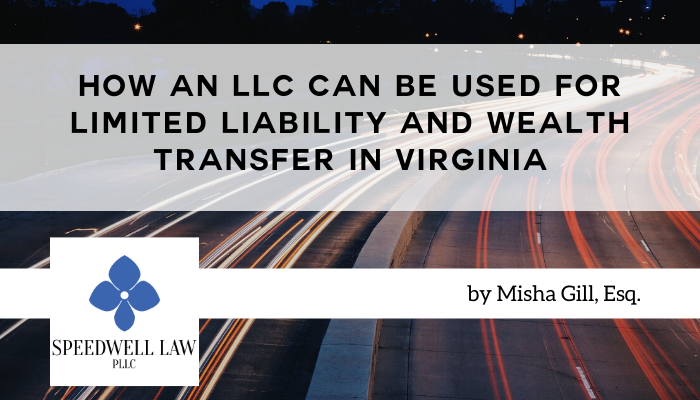
How an LLC Can Be Used For Limited Liability and Wealth Transfer in Virginia
A limited liability company (LLC) is a recognized business entity structure that is set up under state law. An LLC can be structured in a way that will allow you (the owner) to enjoy limited liability for claims against the assets owned by the LLC, while reducing the cost and difficulty of transferring wealth from one generation to the next.
LLCs and Limited Liability
Similar to a corporation, if corporate formalities are properly maintained, an LLC provides a veil of separation between the LLC and its owners. This means that the owners (members) of the LLC are personally insulated against debts, lawsuits, and other claims against the LLC.
In other words, an LLC owner’s personal assets (homes, vehicles, personal possessions, etc.) are not at risk of being lost to claims arising out of the ownership, operation, or use of any business, real estate, or asset owned by the LLC. All that an owner/member can lose is their interest in the LLC.
LLCs and Wealth Transfer
If you own a great deal of wealth and have a family, one of your major concerns is how you will be able to transfer that wealth to your children in an orderly, structured, and tax-efficient manner. One wealth transfer tool that can be used to address this concern is an LLC.
An LLC can be used to allocate non-management shares in the LLC to your beneficiaries at a discounted tax rate. This will allow you to transfer more of your assets to your beneficiaries quicker and with fewer tax consequences or, if you only transfer the maximum amount allowed each year under the annual gift tax exclusion, no tax consequences at all.
Under current gift tax laws, each parent can transfer $15,000 per child annually, completely tax-free. This means that a married couple can transfer $30,000 per year, per child, without dipping into their lifetime gift tax exemptions (currently $11.58 million as of 2020.)
Here is how this works:
First, you set up an LLC and transfer your assets into it. Then you determine how to convert the market value of those assets into units of LLC ownership. Finally, you transfer these units of LLC ownership to your children.
LLCs do not issue stock. Instead, LLCs issue “membership units”. These membership units can be issued in different classes. For instance, one class may have management rights and another with no management rights.
Because membership units without management rights are less marketable, the value of non-management, membership units can be substantially discounted before they are transferred—up to 40% of their perceived market value in many cases.
So, for example, if you wish to gift ownership of non-management, membership units valued at $1000, you may be able to discount the value of each unit by 40%. This would decrease their value to $600 each. Then, instead of reaching the limit of your gift tax exclusion by transferring only 15 shares to a child, you can transfer 25 shares before you reach the limit.
In this way, you will be able to transfer more than the $15,000 gift limit per child each year, without incurring a gift tax. Thus, you will have transferred wealth to your children in advance of your death, and with a lower tax burden than you would otherwise have incurred. In addition, you will have reduced the overall value of your estate, which will ultimately result in a lower estate tax burden after you pass away.
How an Experienced Virginia Estate Planning Attorney Can Help
An LLC can limit your personal liability for claims against your assets and incorporate actions to discount the value of those assets before you transfer them to your heirs and beneficiaries. However, the LLC must be formed and managed properly in order to enjoy these benefits.
You would, therefore, be wise to seek competent advice. The assistance of an experienced Virginia estate planning attorney can get you past all of the potential pitfalls inherent in setting up and using an LLC for limited liability and wealth transfer purposes. To learn more, give us a call at (703) 553-2577, or use the contact form on our website to arrange a consultation with an experienced estate planning attorney.
The information on this site is for general informational purposes only. The information presented in this site is not legal advice or a legal opinion. You should seek the advice of legal counsel of your choice before acting upon any of the information in this site.





